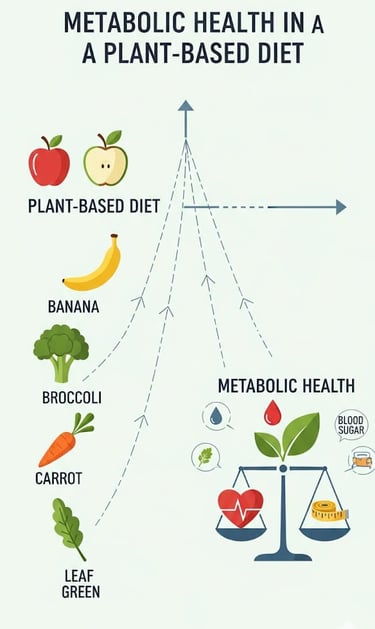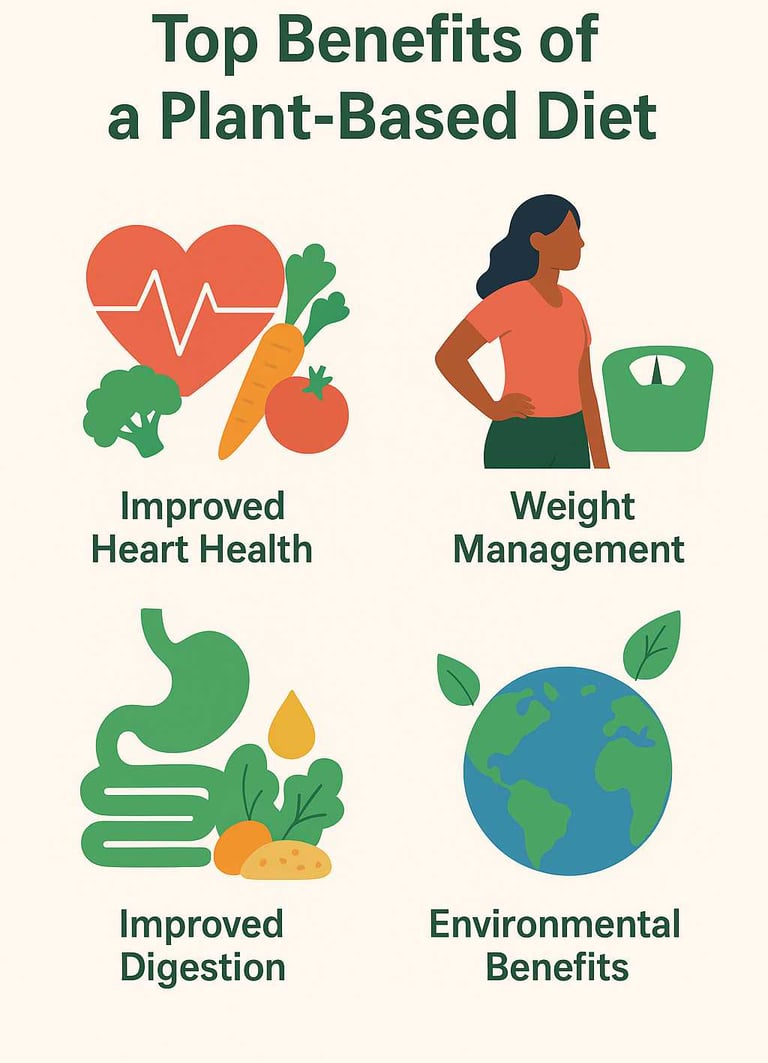DAILY BEST KNOWLEDGE
Top Benefits of a Plant-Based Diet
Discover the benefits of a plant-based diet and how healthy eating with plant-based foods can improve your well-being, reduce disease risk, and support a sustainable lifestyle.
HEALTH
Iftikhar Ishaque Memon
9/26/20254 min read
The Comprehensive Benefits of a Plant-Based Diet:
Adopting a plant-based diet has gained significant attention in recent years due to its remarkable impact on health and well-being.
Numerous scientific studies have highlighted the positive effects of a plant-based diet, including a reduced risk of chronic illnesses such as heart disease, diabetes, and certain types of cancer. Beyond health, this lifestyle also supports environmental sustainability by lowering the carbon footprint associated with food production. Individuals who transition to a plant-based diet often report increased energy levels, improved digestion, and better weight management.
Adopting a plant-based diet is more than a trend; it is a lifestyle choice that offers profound health, environmental, and ethical benefits. Centered around fruits, vegetables, grains, legumes, nuts, and seeds, this diet emphasizes whole, minimally processed foods derived from plants. Below, we explore the key advantages of embracing a plant-based diet and why it’s gaining global popularity.
1. Nutrient-Rich and Whole Foods
A plant-based diet is naturally rich in essential nutrients like fiber, vitamins, minerals, and antioxidants. These nutrients support overall health by improving digestion, enhancing immune function, and reducing inflammation. Whole plant foods provide complex carbohydrates and healthy fats, which contribute to sustained energy levels and balanced blood sugar.
A plant-based diet is naturally rich in essential nutrients, including fiber, vitamins, minerals, and antioxidants. According to a 2020 systematic review in the journal Nutrients, individuals following plant-based diets typically consume more fiber, vitamin C, vitamin E, folate, and magnesium compared to those on omnivorous diets. These nutrients support digestive health, strengthen the immune system, and reduce inflammation. For example, the high fiber content—averaging 41 grams per day in plant-based eaters versus 27 grams in omnivores—promotes regularity and lowers cholesterol levels.
2. Reduced Risk of Chronic Diseases
Scientific research consistently links plant-based diets with a lower risk of chronic illnesses, including heart disease, type 2 diabetes, and certain cancers. The high fiber content helps regulate cholesterol and blood pressure, while antioxidants combat oxidative stress. For more information, visit www.health.harvard.edu.
Research consistently links plant-based diets to a lower risk of chronic diseases. A large 2019 study published in the Journal of the American Heart Association found that people who ate primarily plant-based foods had a 16% lower risk of cardiovascular disease and a 32% lower risk of dying from a cardiovascular event, compared to those with the least plant-based diets. Another meta-analysis in JAMA Internal Medicine showed that vegetarian diets reduced the risk of developing type 2 diabetes by 23%. These findings highlight how high fiber, antioxidants, and low saturated fat in plant-based diets help regulate cholesterol and blood pressure, reducing disease risk.
3. Weight Management and Metabolic Health
Many individuals find plant-based diets effective for healthy weight management. The fiber-rich foods promote satiety, reducing overall calorie intake without compromising nutrition. Additionally, plant-based diets improve insulin sensitivity and reduce inflammation, which are crucial for preventing metabolic syndrome and type 2 diabetes.
4. Environmental Sustainability
Beyond personal health, plant-based diets play a vital role in protecting the environment. Animal agriculture is a major contributor to greenhouse gas emissions, deforestation, and water consumption. By choosing plants over animal products, individuals reduce their carbon footprint and conserve natural resources. The United Nations Food and Agriculture Organization (FAO) highlights that shifting global diets toward plant-based foods is essential for sustainable food systems and combating climate change.
5. Ethical Considerations
Many adopt plant-based diets for ethical reasons, seeking to reduce animal suffering and promote humane treatment. This diet aligns with values of compassion and sustainability, fostering a more conscientious relationship with food.
6. Enhanced Energy and Well-being
People who switch to plant-based eating often report increased energy, better digestion, and overall improved well-being. The abundance of vitamins and minerals supports mental clarity and physical vitality, making it easier to maintain an active lifestyle.
Conclusion
Embracing a plant-based diet offers a wealth of scientifically supported health benefits, from a reduced risk of chronic diseases to improved energy and well-being. By focusing on whole, nutrient-rich plant foods, individuals can enjoy better digestion, enhanced immunity, and a lower environmental impact. Research from leading institutions confirms that plant-based eating is not only effective for disease prevention but also supports sustainable living and ethical food choices. Whether your goal is to improve your health or contribute positively to the planet, a plant-based diet is a powerful and rewarding path forward.
Frequently Asked Questions (FAQ)
Q1: Can I get enough protein on a plant-based diet?
Absolutely. A thoughtfully planned plant-based diet can provide all the essential amino acids your body needs. Excellent sources of plant protein include lentils, chickpeas, quinoa, tofu, tempeh, and a variety of nuts and seeds.
Q2: Is a plant-based diet appropriate for children, seniors, and athletes?
Yes, plant-based diets are suitable for all life stages, including childhood, older adulthood, and those with higher physical demands. It is important to ensure a varied intake of whole foods and to pay special attention to nutrients such as vitamin B12, iron, calcium, and omega-3 fatty acids, which may require fortified foods or supplements.
Q3: Do I need to take supplements on a plant-based diet?
While plant-based diets are rich in most nutrients, vitamin B12 is not naturally present in plant foods and should be supplemented. Depending on individual needs and local sunlight exposure, vitamin D and omega-3 from algae oil may also be recommended.
Q4: How does a plant-based diet benefit the environment?
Plant-based diets have a significantly lower environmental impact than animal-based diets. They contribute to reduced greenhouse gas emissions, lower water usage, and less land degradation, making them a sustainable choice for the planet.
Q5: Are plant-based diets expensive or difficult to maintain?
Not at all. Many staple foods, such as beans, lentils, rice, oats, and seasonal vegetables, are budget-friendly and widely available. With a little planning and creativity, a plant-based diet can be both affordable and enjoyable.
For information about Strengthen your immune system, visit https://www.dailybestknowledge.online/12-superfoods-that-strengthen-your-immune-system




© 2025. All rights reserved.
This platform delivers well-researched articles to empower your personal and professional life.


